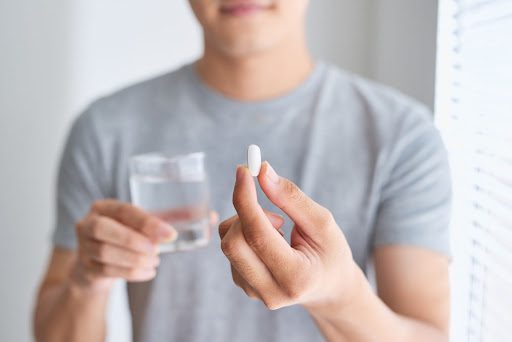Along with their ability to provide significant relief for depression symptoms, the therapeutic impact of antidepressants goes well beyond mood disorders. The role of neurotransmitter activity in both emotional and cognitive functioning has led to a better understanding of psychological symptoms and the commonalities of many mental conditions. These discoveries have brought to light additional uses beyond the treatment of mental health conditions, such as using antidepressants for back pain relief. Despite the known efficacy of antidepressants for many disorders, incomplete symptom relief can occur, and some individuals may consider treatments with less impact from adverse side effects.
Read on to learn what antidepressants are used for other than depression. Then review therapeutic considerations for antidepressant use with multiple psychiatric disorders. Then learn the benefits of magnetic stimulation therapy used with antidepressants or as a standalone treatment.

In an effort to find out what antidepressants can be used for beyond depression, obsessive-compulsive disorder (OCD) has been highlighted as greatly benefiting from this family of medications.
OCD is characterized by obsessions, repeated distressing thoughts, and compulsions, actions meant to relieve the distress caused by these thoughts. Antidepressants impacting the neurotransmitter serotonin are the most effective for obsessive-compulsive disorder (OCD) symptoms. These include selective serotonin reuptake inhibitors (SSRIs) and clomipramine, an older tricyclic antidepressant with a high affinity for serotonin.
Post-traumatic stress disorder (PTSD) may occur when an individual is exposed to a trauma, either directly from personal experience or indirectly when exposed to someone else’s trauma. Symptoms include intrusive disturbing thoughts and memories of the experience, changed cognition and mood, and hyperarousal or emotional numbness.
While antidepressants have not been shown to directly address the trauma of PTSD, they can impact symptom severity, improving quality of life by making symptoms less distressing and disruptive. The FDA has approved SSRIs paroxetine and sertraline as first-line medication options.
SSRIs and selective norepinephrine reuptake inhibitors (SNRIs) are typically well-tolerated and are considered first-line treatments for several anxiety disorders. Side effects that do occur in the first few weeks, such as mild nausea and jitteriness, may be managed by starting with a lower dose. All antidepressants are also considered anxiolytics, medications known to improve anxiety symptoms. Research suggests that enhanced serotonin activity is the therapeutic mechanism behind this effect.
Panic disorder is characterized by frequent episodes of intense fear that are unexpected and distressing, with symptoms such as heart palpitations, digestive distress, and difficulty breathing. Research evidence shows that SSRIs are effective panic disorder treatments, with venlafaxine as the most effective for short-term panic symptoms and mirtazapine having the most significant impact on anxiety symptoms.
Phobias are psychiatric disorders characterized by intense irrational fear or avoidance of something that presents little to no real danger. The two FDA-approved medications for treating social phobia are sertraline (SSRI) and venlafaxine (SNRI). While several antidepressants may be effective for agoraphobia, studies show paroxetine offers significant benefits for both panic and phobic symptoms.
Other uses for antidepressants include the treatment of eating disorders. This stands to reason, as eating disorder cases often occur with anxiety and depressive disorders. Antidepressants have been shown to improve overall well-being by reducing symptoms of these co-occurring disorders, even if primary eating disorder symptoms and outcomes are not directly impacted.
Due to their significant impact on physical health, eating disorders present heightened safety concerns for antidepressant treatments.
Anorexia nervosa is a disorder characterized by restrictive eating and excessively exercise due to an intense fear of gaining weight and a distorted body image, with individuals often losing dangerous amounts of weight. Nutrition management and cognitive therapy are first-line treatments for anorexia nervosa, and research does not support antidepressants as a sole intervention. SSRIs may provide additional symptom relief, especially for those with underlying depression and anxiety disorders and in the maintenance treatment phase.
Bulimia nervosa is a disorder where individuals eat large quantities of food and use inappropriate behaviors to control weight, such as laxatives, vomiting, fasting, and excessive exercise. Individuals affected by bulimia are preoccupied with body image and often have normal body weight.
Fluoxetine is currently the only antidepressant approved to treat bulimia nervosa, and individuals with an early and rapid response are likely to benefit the most. It can reduce vomiting and binge-eating episodes by up to 50% and is fairly well-tolerated, with insomnia being the most commonly reported adverse effect. Limited research shows that other SSRIs may be helpful for bulimia nervosa, but few studies have been done to examine medication treatments, let alone other antidepressants.
Binge eating disorder is a disorder characterized by episodes of rapid excessive eating, eating secretly, and a loss of control and sense of disgust overeating behaviors. Studies show that second-generation antidepressants reduce binge eating behaviors, eating-related obsessions and compulsions, and depression. However, antidepressant treatment is not always associated with observed weight loss, even when binging behaviors are reduced. Research findings suggest that fluoxetine may benefit those with depression and reduce binge eating, but the evidence is inconclusive.
Orthorexia nervosa is a restrictive eating condition defined by an obsession with eating only foods perceived to be healthy and clean. Because orthorexia nervosa is not (yet) recognized as an official psychiatric disorder, it has gotten relatively little attention, and those with this insidious disorder often do not know they have it. No studies have been done on antidepressants as a treatment for orthorexia, though its symptom overlap with anorexia nervosa indicates SSRIs may be beneficial.
Bipolar disorder is a psychiatric disorder defined by episodes of significant mood changes that impair an individual’s ability to function. Manic symptoms include elevated mood, excessive energy, and irritability, and depressive symptoms presents as low mood, fatigue, and loss of interest in pleasurable activities.
Emergent manic episodes are the biggest concern when treating bipolar disorder with SSRIs, but using a lower dose is the key to better efficacy. As the dosage increases, effectiveness decreases as the impact of adverse effects and risk of potential mania strengthens. Also, individuals that actually have major depressive disorder may present with false manic episodes, giving the appearance of bipolar disorder without the same level of risk with treatment-induced mania.
While antidepressants are widely used with effective outcomes for several mental health disorders, adverse effects are a concern for some individuals. Evidence-based non-pharmacological treatments are also safe and effective treatment options to consider.
Though antidepressants are widely used with effective outcomes for several mental health disorders, adverse effects are a concern for some individuals. Most adverse effects of antidepressants are mild and temporary, providing much-needed relief as individuals address their mental health needs. However, some individuals may be understandably cautious about using antidepressants because of physical health issues, potential drug interactions, or the development of treatment-resistant symptoms. They seek safe and effective non-medication treatments, and magnetic stimulation therapy is one such option to consider.
Deep transcranial magnetic stimulation (Deep TMS) is an FDA-cleared treatment for symptoms of major depressive disorder, anxious depression, and obsessive-compulsive disorder. Embedded in a cushioned helmet, the treatment’s patented coil delivers targeted magnetic pulses to brain regions associated with psychological symptoms during brief treatment sessions held over several weeks. The magnetic stimulation regulates neurological activity in these regions, leading to symptom improvement. Side effects are usually mild and temporary, such as a brief headache. Because of its noninvasive nature, Deep TMS has no long-term adverse effects and is proven safe and effective to use along with other treatments.

The efficacy of antidepressants makes them invaluable treatments for depression and beyond. Researchers are still learning about the biochemical mechanisms of antidepressants while discovering innovative ways to use the most effective attributes of these medications. By reducing the burden of symptoms, antidepressants have been proven to offer hope for many patients battling depression and other mental health conditions.